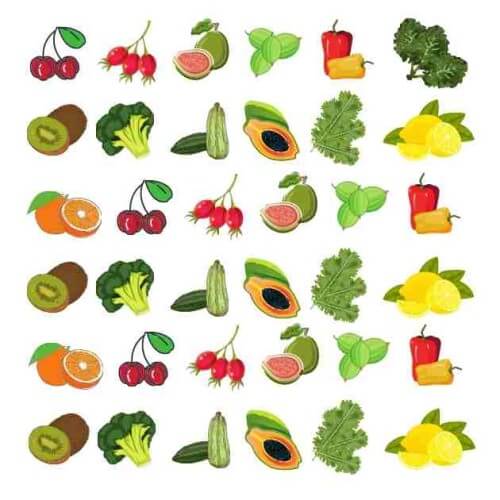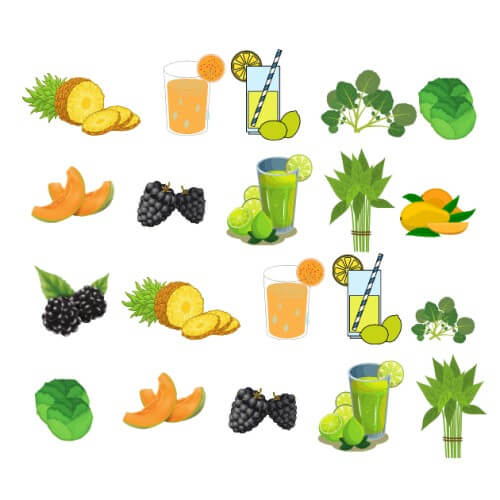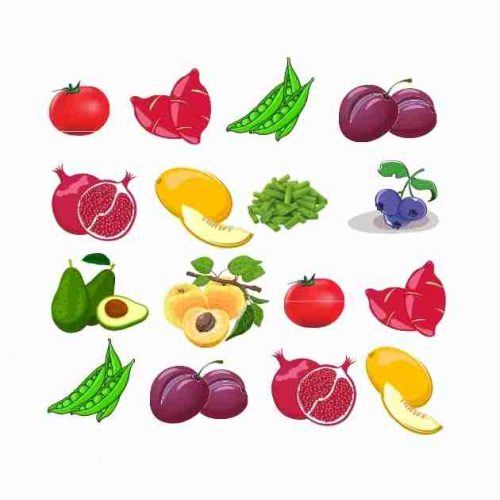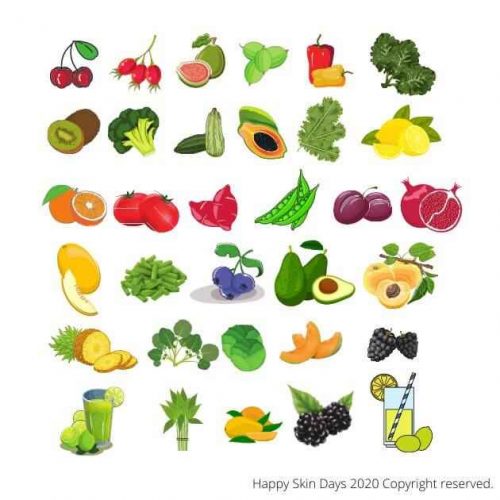The best source of vitamin C consumption is through your diet. As Vitamin C is not stable, doesn’t like heat, cold, long-term storage, your best bet to get optimal Vitamin C results is to:
EAT RAW FRUITS AND VEGETABLES RICH IN VITAMIN C.
If you need a refresher on why Vitamin C is so important to your skincare regime, then read this blog
Q1) Do I need to consume Vitamin C every day?
Yes.
Humans have lost the ability to synthesize Vitamin C and cannot store excessive amounts. So, if you are planning to have one kilo of imported kiwi on Monday, thinking yup, that’s my Vitamin C dose done for the week, then:
- Its a fabulous waste of money and the
- Excess Vitamin C is not stored, but excreted.
Q2) How much Vitamin C should I have?
The US guidelines for the Recommended Dietary Allowance (RDA) for individuals that are 19 + years is:
- Female: 75 mg
- Male: 90 mg
This assumes that the person is healthy. So, example smokers who lead an unhealthy lifestyle, need more Vitamin C as do pregnant and lactating women, who have extra nutritional needs. These are the RDAs for them:
- Female (pregnant): 85mg
- Female (lactation): 120mg
Smokers require 35mg/day more Vitamin C than non-smokers. There isn’t conclusive evidence on passive smokers, but I would consume more Vitamin C if I was one.
Q3) Are there any side-effects of taking too much Vitamin C? Is taking 1,000 mg of Vitamin C safe?
Vitamin C has low toxicity and is not likely to cause serious adverse effects if you increase uptake to about 1,000 mg/day or 1 g/day. BUT again, this assumes that you are in perfect health. If you have liver issues (as my mother does) or kidney issues (as her sister does), then 1,000mg is a terrible idea.
Use your own judgement and don’t be a sheep.
Common complaints of excessive Vitamin C consumption include diarrhoea, nausea, abdominal cramps, heartburn, headache, insomnia.
To avoid the above, I would suggest gradually increase Vitamin C consumption over several weeks.
Q4) Tips for preserving Vitamin C content
- The golden rule concerning Vitamin C is that it’s fragile and hates heat, cold, changes in pH, oxygen and so on. It’s the diva of vitamins and minerals.
- Both transport and long-term storage reduces Vitamin C. Therefore, eat fresh and local produce. If you can afford it, organic options are better – they retain higher amounts of vitamins and minerals. But I can’t afford organic blueberries and I will live..
- You can only absorb a certain amount of Vitamin C from each type of food. Therefore, eating a COLOURFUL plate of fruits and vegetables is the best answer to increasing your Vitamin C content.
- Uncooked, raw food always has more Vitamin C. If you prefer vegetable juices – kale, bitter gourd, broccoli – then drink it as soon as its made. As soon as Vitamin C is exposed to air it starts to rapidly degrade.
Q4) What foods have the HIGHEST Vitamin C content?
(All foods are raw, unless otherwise indicated)
Foods that contain more than 50mg of Vitamin C per 100g

- (Acerola juice – comes from Acerola cherries, which I had to look up and I have never actually seen)
- Rose hips – never seen them in India or any of the 5 countries I have lived in
- Guavas
- Amla
- Yellow peppers
- Red peppers
- Kale
- Kiwi fruit
- Broccoli
- Bitter gourd
- Papaya
- Mustard greens
- Lemons, Oranges
Foods that contain more than 20mg of Vitamin C per 100g and less than 50mg

- Pineapple
- Orange juice
- Lemon juice
- Watercress
- Cabbage, cooked, boiled with salt
- Cantaloupe melon
- Mulberries
- Bitter gourd, cooked, boiled with salt
- Lime juice
- Mangoes
- Spinach
- Blackberries
Foods that contain more than 10mg of Vitamin C per 100g and less than 20mg

- Red tomatoes, cooked and stewed
- Red tomatoes
- Sweet potato, boiled without skin with salt
- Peas
- Plums
- Pomegranate
- Honeydew Melon
- Green beans, cooked, boiled, drained with salt
- Blueberries
- Avocado
- Apricots
Foods that contain less than 10mg of Vitamin C
- Aubergine, Apples, Banana, Beetroot (cooked), Carrots, Cherries, Cucumbers, Figs, Grapes, Nectarines, Onions, Watermelon, Peaches, Pears
That’s it from me. Drop me a line at email@happyskindays.com if you have any queries
*****
You may also be interested in these blogs:
Should I use a topical Vitamin C product?
fresh Vitamin C mask – product review
*****
Sources: Mayo Clinic, US government website and documents on Vitamin C
*****
Copyright 2020: I wish to remind some of you that I am an independent and non-affiliated skincare blogger. I invest my own time, money, blood, sweat, and tears in creating content for my blog. My blog is read in multiple countries and according to my lawyers, each of those countries protects my content and rights under copyright law. If you would like to use my content, do the right thing, and write to me at email@happyskindays.com. Don’t be that person who steals content, because it’s arrogant, disrespectful, and ultimately, a crime.
